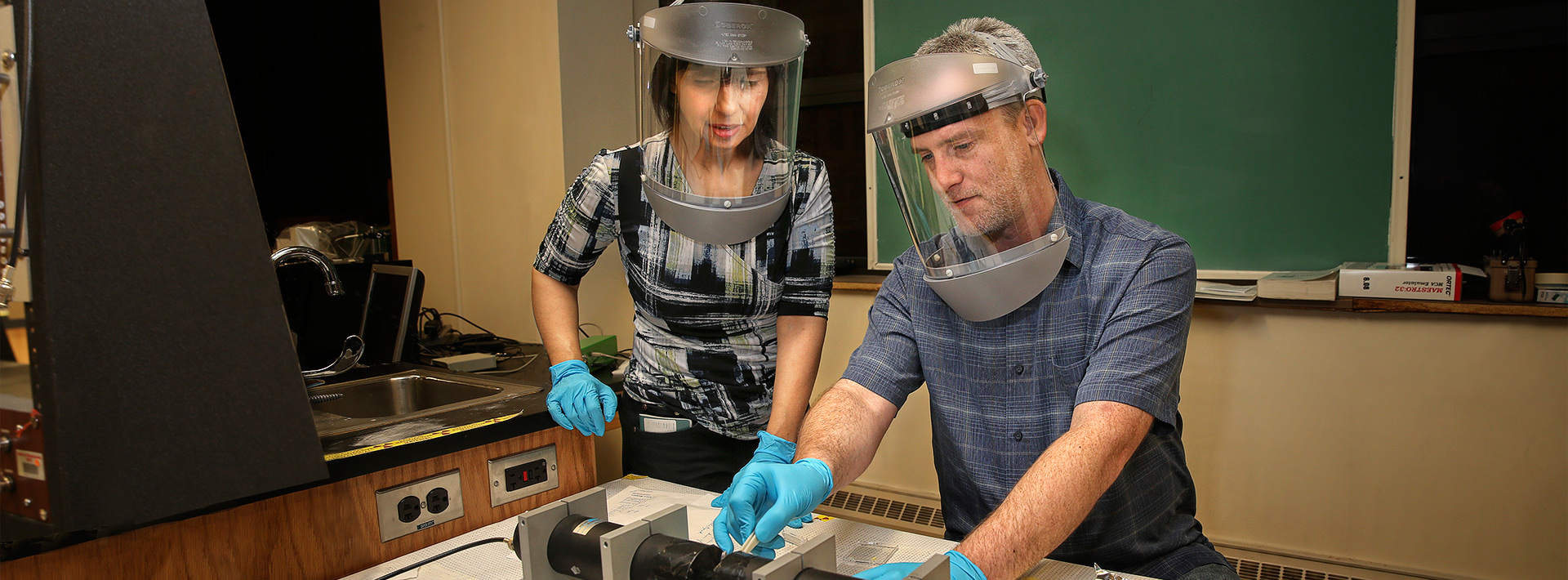World-class research experience
Physics student never turns down chances to learn

By Jen Sobolewski
Learning is second nature to Paul Husband. He makes databases and spreadsheets for fun and admittedly will read and do anything that intrigues him. Husband recently graduated from BGSU with a degree in physics and is staying at the University to earn his graduate degree in the same field, with more of a focus on astrophysics.
“I like to learn everything I can,” he explained. “You have to be open to all opportunities.”
The 38 year old wasn’t a strong student in high school and after attempting to work and go to college, he decided to enroll in the Army. He was discharged after five years and several trips overseas. After working various jobs for another 10 years, it was an online love connection that brought him to northwest Ohio.
He completed a degree in math at Owens Community College and then transferred to BGSU in 2013. The timing was fortunate. Dr. Farida Selim, physics, had just joined the faculty. Husband met her during his first semester at BGSU and learned about new research opportunities.
“I was talking to her about what I wanted to do with gravity—I’d seen a paper about matter and anti-matter and a gravity effect,” Husband said. “It’s very fringe, but it’s out there. She brought up positrons and it just clicked. It seemed like a really good idea.”
Husband received a Center for Undergraduate Research (CURS) award to research the positron, a type of anti-matter, and apply it to study transparent ceramics. In a few months, the research led to significant results and a peer-reviewed paper, “Positron Annihilation in Transparent Ceramics,” which was accepted for publication in the journal Physics C.
The study looked at how positron annihilation spectroscopy can be used to study the porosity and defects of transparent ceramics, a new form of nanopowder that becomes very transparent when pressure and temperature is applied. It is emerging as an excellent candidate for many applications including lasers and illumination. Husband’s work was the first application of positron annihilation in transparent ceramics and is expected to significantly advance the technology. BGSU is one of the few places in the eastern U.S. that can conduct positron annihilation spectroscopy.
“Most of positron research is overseas. There are not many people studying positrons in the U.S.,” explained Selim. “Positrons and anti-matter is interesting physics, but really hard. I’m always cautious when I work with undergrads. I don’t assign them positron work. It’s a really hard subject, but Paul was quite interested to learn it.”
Husband’s work with Selim led to a trip to Tokyo for the International Positron Conference. He and Selim were the only Americans in attendance. CURS, the College of Arts and Sciences and the physics department covered all of the costs.
“This is one of the biggest international conferences on positrons and it’s only held every three years,” said Selim. “The most important results about positron studies of defects are discussed there. The University made a huge commitment to an undergraduate student.”
“It was very informative, not only in what I could understand, but to see what was going on that I didn’t know about as far as research goes. Japan was honestly a great experience because I got to present and see the other presenters and the work that is being done with positrons,” said Husband.
“All this would not have happened without CURS and the great support we got from the dean of Arts and Sciences, Dr. Raymond Craig; Dr. John Laird, chair of physics; and the director of Undergraduate Research, Dr. Cordula Mora,” added Selim.
Husband said two years ago he never would have thought he’d do positron research and go to an international conference.
“You think of a physics researcher and you think of someone younger, but it is possible to go after your dream and achieve it at any age. The number one thing I’d say to anyone is look at it, do it and talk to people who are doing it because they have ways to make it happen. Don’t think you have to do it on your own—have those conversations. Because otherwise you could end up doing something you don’t enjoy.”
Husband said he doesn’t make plans for the future, preferring to keep his options open. He’ll get his master’s degree in physics at BGSU and then consider whether to go after a Ph.D., or explore something else.
“My future goals, if everything goes the way I want, are to study gravity and how it acts in interstellar portions of the universe. Our current measurements tell us the universe is expanding, and we don’t know why. It’s been proposed this is dark energy and I think it’s linked to gravity, so that’s my future research.”
One thing is certain: Husband never plans to stop learning. “School is never a bad option as long as you put in the work and time. It’s for everyone who is looking at their life and thinking it could be better.”
Updated: 12/02/2017 12:46AM
